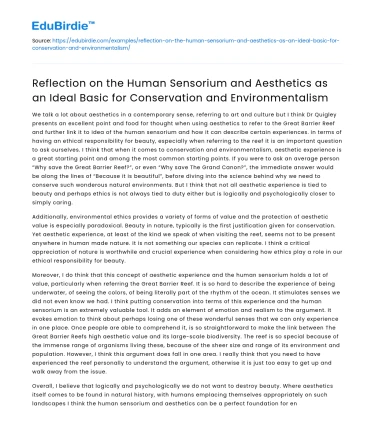We talk a lot about aesthetics in a contemporary sense, referring to art and culture but I think Dr Quigley presents an excellent point and food for thought when using aesthetics to refer to the Great Barrier Reef and further link it to idea of the human sensorium and how it can describe certain experiences. In terms of having an ethical responsibility for beauty, especially when referring to the reef it is an important question to ask ourselves. I think that when it comes to conservation and environmentalism, aesthetic experience is a great starting point and among the most common starting points. If you were to ask an average person “Why save the Great Barrier Reef?”, or even “Why save The Grand Canon?”, the immediate answer would be along the lines of “Because it is beautiful”, before diving into the science behind why we need to conserve such wonderous natural environments. But I think that not all aesthetic experience is tied to beauty and perhaps ethics is not always tied to duty either but is logically and psychologically closer to simply caring.
Additionally, environmental ethics provides a variety of forms of value and the protection of aesthetic value is especially paradoxical. Beauty in nature, typically is the first justification given for conservation. Yet aesthetic experience, at least of the kind we speak of when visiting the reef, seems not to be present anywhere in human made nature. It is not something our species can replicate. I think a critical appreciation of nature is worthwhile and crucial experience when considering how ethics play a role in our ethical responsibility for beauty.
Save your time!
We can take care of your essay
- Proper editing and formatting
- Free revision, title page, and bibliography
- Flexible prices and money-back guarantee
Moreover, I do think that this concept of aesthetic experience and the human sensorium holds a lot of value, particularly when referring the Great Barrier Reef. It is so hard to describe the experience of being underwater, of seeing the colors, of being literally part of the rhythm of the ocean. It stimulates senses we did not even know we had. I think putting conservation into terms of this experience and the human sensorium is an extremely valuable tool. It adds an element of emotion and realism to the argument. It evokes emotion to think about perhaps losing one of these wonderful senses that we can only experience in one place. Once people are able to comprehend it, is so straightforward to make the link between The Great Barrier Reefs high aesthetic value and its large-scale biodiversity. The reef is so special because of the immense range of organisms living these, because of the sheer size and range of its environment and population. However, I think this argument does fall in one area. I really think that you need to have experienced the reef personally to understand the argument, otherwise it is just too easy to get up and walk away from the issue.
Overall, I believe that logically and psychologically we do not want to destroy beauty. Where aesthetics itself comes to be found in natural history, with humans emplacing themselves appropriately on such landscapes I think the human sensorium and aesthetics can be a perfect foundation for environmental ethics and conservation.
Did you like this example?
Make sure you submit a unique essay
Our writers will provide you with an essay sample written from scratch: any topic, any deadline, any instructions.
Cite this paper
-
APA
-
MLA
-
Harvard
-
Vancouver
Human Sensorium, Aesthetics, & Conservation in Environmentalism.
(2022, August 25). Edubirdie. Retrieved April 18, 2025, from https://hub.edubirdie.com/examples/reflection-on-the-human-sensorium-and-aesthetics-as-an-ideal-basic-for-conservation-and-environmentalism/
“Human Sensorium, Aesthetics, & Conservation in Environmentalism.” Edubirdie, 25 Aug. 2022, hub.edubirdie.com/examples/reflection-on-the-human-sensorium-and-aesthetics-as-an-ideal-basic-for-conservation-and-environmentalism/
Human Sensorium, Aesthetics, & Conservation in Environmentalism. [online].
Available at: <https://hub.edubirdie.com/examples/reflection-on-the-human-sensorium-and-aesthetics-as-an-ideal-basic-for-conservation-and-environmentalism/> [Accessed 18 Apr. 2025].
Human Sensorium, Aesthetics, & Conservation in Environmentalism [Internet]. Edubirdie.
2022 Aug 25 [cited 2025 Apr 18].
Available from: https://hub.edubirdie.com/examples/reflection-on-the-human-sensorium-and-aesthetics-as-an-ideal-basic-for-conservation-and-environmentalism/
copy






 Stuck on your essay?
Stuck on your essay?

